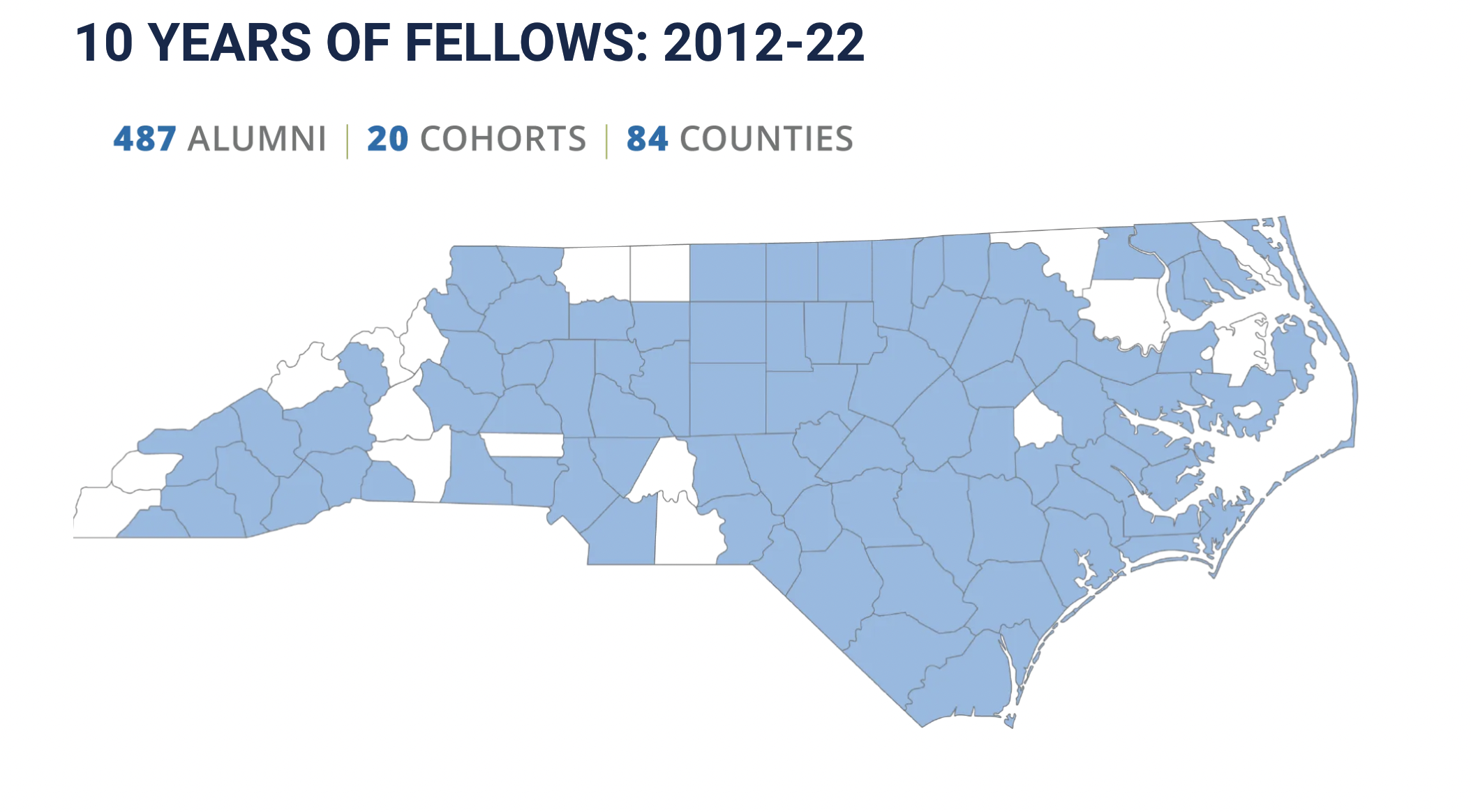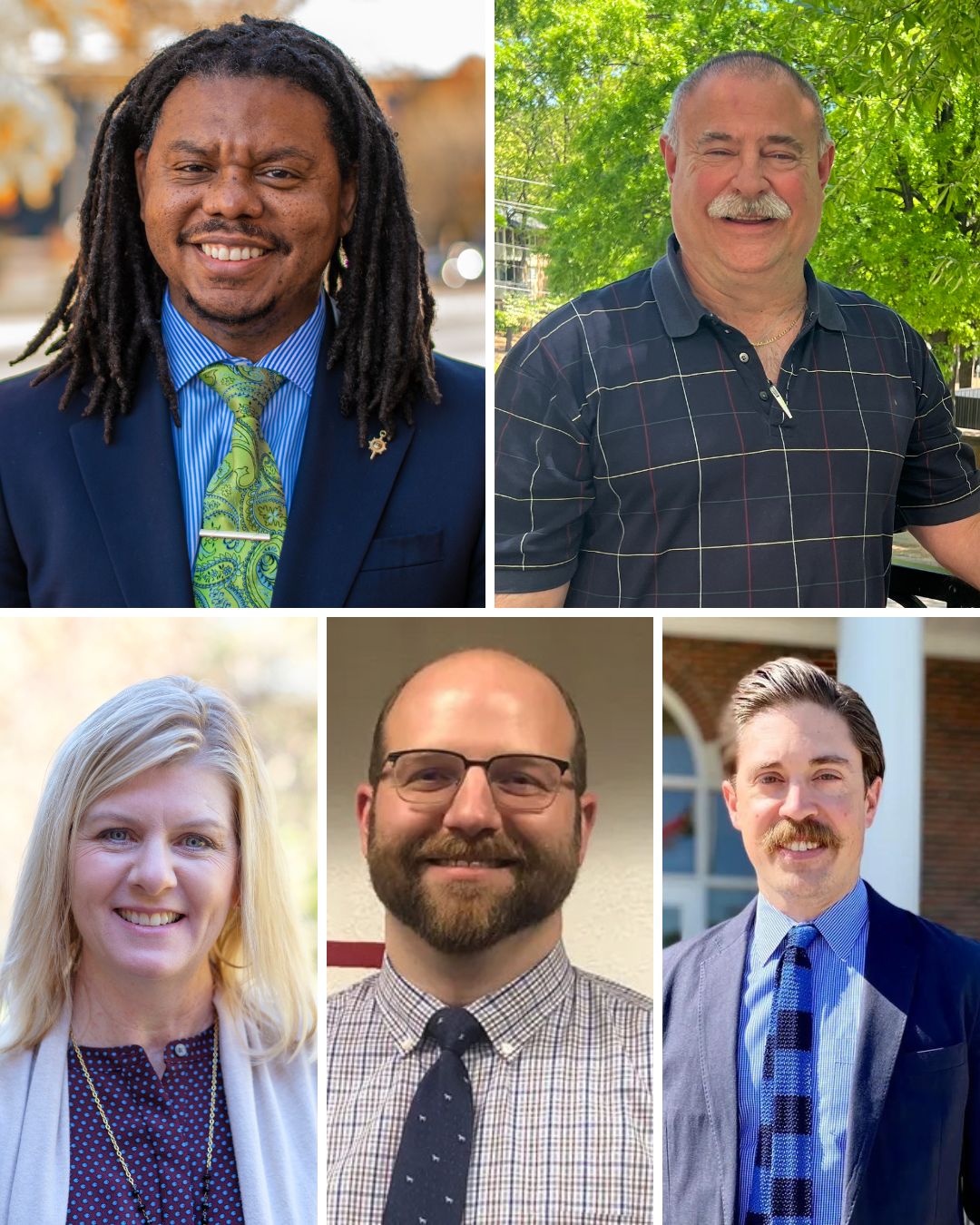Enduring Lessons on Leadership - 10 Years of LGFCU Fellows
Committed local government leaders take the next step in their personal and organizational leadership journey by becoming an LGFCU Fellow and completing the Leading for Results program, which includes engaging in executive coaching and joining the alumni network. 2022 marked the program’s tenth year of offering Leading for Results, bringing 48 new fellows from municipal and county governments across 31 counties.
Since the beginning, the program has used the Five Practices of Exemplary Leadership as a foundational component of the Leading for Results class. These five practices represent behaviors that are common to the most extraordinary leaders and that when used more frequently enhance an individual’s leadership. LGFCU Fellows receive a 360 evaluation that provides them insights on how frequently they are engaging in the behaviors of this model. They gain insights and understanding into the practices as well as time to practice them. Alumni continue to draw on these practices and use them in their leadership work daily.
Maria Turnley, Nurse Consultant, North Carolina Department of Health and Human Services - Model the Way
The exemplary leadership model asserts the importance of leadership that begins with character and establishing principles of how people should be treated and goals pursued. Maria Turnley exemplifies values-driven standards of excellence for teams she leads, and for those around her.
“Model the Way means that I need to embody traits that I expect of my staff. It’s important that my staff know I am not asking anything unreasonable or anything that I wouldn’t do myself,” said Turnley.
Turnley spent time in the program evaluating what her own core values are in the workplace—things like accountability, professionalism, and a strong work ethic.
“Before being in this program I didn’t think of my personal values as key to being a good leader,” said Turnley. “Since taking the program, I do more thinking and talking about values to guide our work…knowing your values is huge.”
When Maria’s work requires her to work with outside organizations, she leads discussions with them on values-driven leadership and encourages others to brainstorm what their own values are.
“I’ve realized that leadership is a mindset…it doesn’t matter if you are a mom or only have one person to manage, you can still think of yourself as a leader,” said Turnley.
Chris Hinnant, Inspections Director, Town of Fuquay-Varina - Inspire a Shared Vision
Leaders must create a shared vision and enlist others to join them on their pursuit of this goal. In 2015, Chris Hinnant became inspections director at the Town of Fuquay-Varina after 23 years of working in the community. In his new role, he was driven to create a new vision to improve upon the department’s work and its aim to be an award-winning department. In the Leading for Results program Chris wrote the first draft of a vision that would be refined and revised but served as his touchstone as he engaged his staff and stakeholders in making this vision a reality.
Trying to get everyone on board with the vision was the biggest challenge for Hinnant. To help operationalize his vision he created a plan with “milestones” for each part. When a milestone was reached he was sure that people would be publicly recognized in staff meetings for the achievement. Milestones would be checked off on a board in front of the whole team. “Once people saw milestones getting met, more and more people got on board and were driving the process themselves,” said Hinnant.
Each department helped set their own strategies to achieve the shared vision, and Hinnant supported them as needed, securing whatever resources the department needed for success. He kept open communication, asked directly for input, and continually checked in to keep things going. By allowing his team to lead the way, Hinnant secured their buy-in for his leadership.
Hinnant makes a point to encourage his employees to develop professionally and publicly recognizes their accomplishments when they do. For example, he has recognized employees for completing certifications in front of the town board. “I’m only as good as the people who work for me, and I want to be a leader who encourages others to be their best,” said Hinnant.
In 2018, Hinnant and his team won the “Outstanding Public Staff” award from the Home Builders Association of Raleigh-Wake County. This award recognized a lot of work, a department that came together around a shared vision, and that made that vision a reality.
Julius Monk, Deputy Superintendent of Operational Services, Durham Public Schools- Challenge the Process
Effective leaders are constantly looking for innovative ways to improve performance and ways to learn from both successes and mistakes. Julius Monk is an example of a leader who constantly pushes for innovation on his team at Durham Public Schools.
“We owe it to our students and the taxpayer to be constantly improving,” said Monk. “To do that, we have to challenge assumptions and look for things to improve.”
Monk discusses leadership values with his team and emphasizes making Challenge the Process a part of every day. He wants his team to drive change and independently identify ways to improve.
Part of fostering innovation means creating an environment where his team feels safe to try new things.
“Part of that is there are no negative consequences for trying something new. I will never fault someone for being innovative,” said Monk. “I also show trust by having people’s backs. For instance, I make sure staff present their own work at board meetings… unless it’s something bad. That’s when I step in. And that lets people know that I have their back, I’m supporting them.”
In staff meetings, Monk and his team learn together about leadership practices. For instance, in preparation for a new strategic plan, he and his team are reading books to study and prepare for that process together.
“Challenges give space to be innovative,” said Monk. He knows that through creating a safe space, sharing knowledge with his team, and showing support, team members can take ownership and rise together to constantly improve on the work they do.
Daniel Cobb, Town Manager, Mills River - Enable Others to Act
Leaders focus on fostering collaboration and strengthening others to do their work. Coming into his role as town manager, Daniel Cobb recognized the need to spend time and focus on establishing trust and building confidence with his new team. To do this, he focused his attention on creating an atmosphere of respect and trust between himself and his team members and empowering his staff with confidence and competence to act.
“To me, Enable Others to Act means giving people ownership and letting them contribute in a meaningful way,” said Cobb.
Cobb empowers leaders on his team to have ownership of their work, share their ideas, and choose the strategy; and he supports them and their ideas in front of others, especially in challenging moments. Showing public support of his team’s ideas has helped them build trust with Cobb.
The Fellows program increased Cobb’s attention to “the emotional side of work.” He realized how important it is to focus on team building, be direct, and cultive positive emotions amongst his direct reports.
One way Cobb has worked on this is through one-on-one meetings with all his direct reports where he asked, “How do you like to receive praise?” Through his time with the Fellows program, he learned to tailor his approach to recognizing people in a way that resonates with them. He also uses one-on-one meetings for relationship building and to ask staff about their goals and help ensure they have the support and resources they need to be successful.
“I’ve taken a lot of courses at the School, and this was the most hands-on and applicable of them all,” said Cobb.
Justin Longino, Town Manager, Town of Boiling Springs - Encourage the Heart
Recognizing individual performance and creating an environment that celebrates collective efforts is a critical practice for all leaders, and one that is in high demand as burnout and stress are at an all-time high. As manager of the Town of Boiling Springs, Justin Longino creates a spirit of community on his team by engaging others and recognizing their hard work in fun and personalized ways.
Longino said many of his ideas on how to recognize his team came from his time in the program. One example of this is his “appreciation table” he implemented during all-staff meetings. At the start of the meetings, Longino pulls out his box of small gifts and shares them with his staff, publicly recognizing “stand out moments” where members of his team have gone above-and-beyond.
“The program helped me learn more about myself and how to motivate others,” said Longino. Participants in the program complete a 360 evaluation, which Longino said gave him insight into his own strengths and weaknesses as a leader. He often refers to his evaluation results as well as other resources shared through the program in his current role.
He also values the program’s alumni events and strong network. “The connections with other alumni have been really helpful for getting feedback. We’ll often reach out to each other for help in tough situations,” Longino said.

2022 represents 10 years of the Fellows program, during which time 487 alumni from 84 different counties have completed the program. The map above illustrates the different areas across North Carolina alumni are from.
Published June 6, 2023



